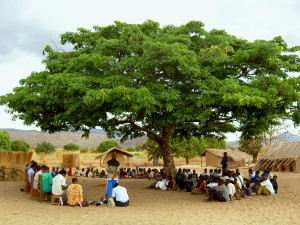Ni ayé igbà kan ri ki ṣe oye ọkọ, ilé gogoro, aṣọ àti owó ni ilé-ìfowó-pamọ́ ni a fi nmọ Ọlọ́rọ̀ bi kò ṣe pé oye Ẹrú, Ìyàwó, Ọmọ, Ẹran ọsin àti oko kòkó rẹpẹtẹ ni a fi n mọ Ọlọ́rọ̀. Ni àsikò yi, Bàbá kan wa ti ó ni Iyawo púpọ̀, Oko rẹpẹtẹ, ogún-lọ́gọ̀ ohun ọsin, ọ̀pọ̀lọpọ̀ Ẹrú tàbi Alágbàṣe, Ọmọ púpọ̀, ṣùgbọ́n ninú gbogbo ọmọ wọnyi, ikan ṣoṣo ni ọkùnrin. Bàbá fi ikan ninú gbogbo Ẹrú ti ó ti pẹ́ pẹ̀lú rẹ, ṣe Olóri fún àwọn Ẹrú yoku. Ẹrú yi fẹ́ràn Bàbá, ó si fi tọkàn-tọkàn ṣe iṣẹ́ fún.
Nigbati Bàbá ti dàgbà, ó pe àwọn àgbà ẹbí lati sọ àsọtẹ́lẹ̀ bi wọn ṣe ma a pín ogún ohun lẹhin ti ohun bá kú nitori kò si iwé-ìhágún bi ti ayé òde oni. Ó ṣe àlàyé pé, ohun fẹ́ràn Olóri Ẹrú gidigidi nitori o fi tọkàn-tọkàn sin ohun, nitori na a, ki wọn kó gbogbo ohun ini ohun fún Ẹrú yi. Ó ni ohun kan ṣoṣo ni ọmọ ọkùnrin ohun ni ẹ̀tọ́ si lati mu.
Lẹhin ọ̀pọ̀lọpọ̀ ọdún, Bàbá re ibi àgbà nrè, ó ku. Lẹhin ìsìnkú, àwọn ẹbí àti àwọn ọmọ Olóògbé pé jọ lati pín ogún. Ni àsikò yi, ọmọ ọkùnrin ni ó n jogún Bàbá, pàtàki àkọ́bí ọkùnrin nitori ohun ni Àrólé. Gẹgẹ bi àsọtẹ́lẹ̀, wọn pe Olóri Ẹrú jade, wọn si ko gbogbo ohun ini Bàbá ti o di Oloogbe fún. Wọn tún pe ọmọ ọkùnrin kan ṣoṣo ti Bàbá bi jade pé ó ni ẹ̀tọ́ lati mu ohun kan ti ó bá wu u ninú gbogbo ohun ini Bàbá rẹ, nitori eyi wọn fún ni ọjọ́ meje lati ronú ohun ti ó bá wù ú jù. Àwọn ẹbí sun ìpàdé si ọjọ́ keje. Inú Ẹrú dùn púpọ̀ nigbati inú ọmọ Bàbá bàjẹ́. Eyi ya gbogbo àwọn ti ó pé jọ lẹ́nu pàtàki ọmọ Bàbá nitori ó rò pé Bàbá kò fẹ́ràn ohun. Lẹhin ìbànújẹ́ yi, ó gbáradi, ó tọ àwọn àgbà lọ fún ìmọ̀ràn.
Ni ọjọ́ keje, ẹbí àti ará tún péjọ lati pari ọ̀rọ̀ ogún pin-pin, wọn pe ọmọ Bàbá jade pé ki ó wá mú ohun kan ṣoṣo ti ó fẹ́ ninú ẹrù Baba rẹ. Ó dide, ó dúpẹ́ lọ́wọ́ gbogbo àwọn ti ó joko, ó yan Olóri Ẹrú gẹgẹ bi àwọn àgbà ti gba a ni ìyànjú. Inú Ẹrú bàjẹ́, ṣùgbọ́n o ni ki Ẹrú má bẹ̀rù, Ẹrú na a ṣe ìlérí lati fi tọkàn-tọkàn tọ́jú ohun ti Bàbá fi silẹ̀. Idi niyi ti Yorùbá ṣe ma npa a lowe pe “Ẹni tó ni Ẹrú ló ni Ẹrù.”
Lára ẹ̀kọ́ itàn yi ni pé, ó dára lati lo ọgbọ́n ọlọ́gbọ́n nitori “Ọgbọ́n ọlọ́gbọ́n ni ki i jẹ ki á pe àgbà ni wèrè”. Ẹ̀kọ́ keji ni pé, ogún ti ó ṣe pàtàki jù ni ki á kọ ọmọ ni ẹ̀kọ́ lati ilé àti lati bójú tó ẹ̀kọ́ ilé-iwé.
ENGLISH TRANSLATION
In time past, Wealthy people are not regarded by the number of cars, skyscrapers, clothing and the amount in the Bank, rather they are regarded as wealthy because of the numerous number of, Wives, Children, Slaves or Labourers, Domestic Animals and their expance Farm land. During that time, there was a man who was well regarded because he owned numerous Wives, lots of Domestic Animals, Slaves or Labourers working for him in the large expanse of Farm and many children but only one was a male child. He appointed one of the most trusted and loyal Slave who had served him selflessly for a longer time as the Slaves’ General Over-sear.
When the Father was becoming old, he invited the family elders in order to give instruction on how to share his property after his demise as Will Writing was not as common as nowadays. He explained his confidence on the Leader of the Slaves because of his meritorious service and dedication, hence he instructed that all his property be given to him. He said his Next of Kin, his only son is entitled to only one item from all his properties.
After many years, the Man joined his Ancestors in death. After his burial, the family and his children gathered to divide his inheritance. During that time, only male children particularly the first son, is entitled to inherit their Father. In accordance with the deceased earlier instruction, the Head of the Slaves was invited and all his Master’s property were handed over to him. Likewise, the deceased’s only son was invited but was told he could only choose one item from all his father’s properties, hence he was given seven days to think over his choice. The next gathering was then postponed. The Head of the Slaves was very happy but the Next of Kin was very sad. Many of the family members including the only son expressed shock. After his grief, he summoned up courage and went out to seek the elders’ wise counsel on the matter.
On the seventh day, the family gathered once again to complete the sharing of the inheritance, the deceased Next of Kin was invited to pick his only choice as instructed by his late father. He got up, thanked all that were present, and then picked the Head of the Slaves or General Over-sear as advised by the Elder during consultation. The Head of the Slave became sad, but his Master’s son asked him not to be afraid, the Slave in return pledged his loyalty to take care of all his Master had left behind. This is why the Yoruba adage which means “One who owns the Slave owns the Slave’s property”.
One of the lessons learnt from this story is to always seek wise counsel because according to the Yoruba adage “Wisdom learnt from others, prevents one from regarding the Elders as madmen/women”. The second lesson, the best legacy is to give children home training as well follow up with quality school education.
Originally posted 2015-10-30 08:30:22. Republished by Blog Post Promoter




